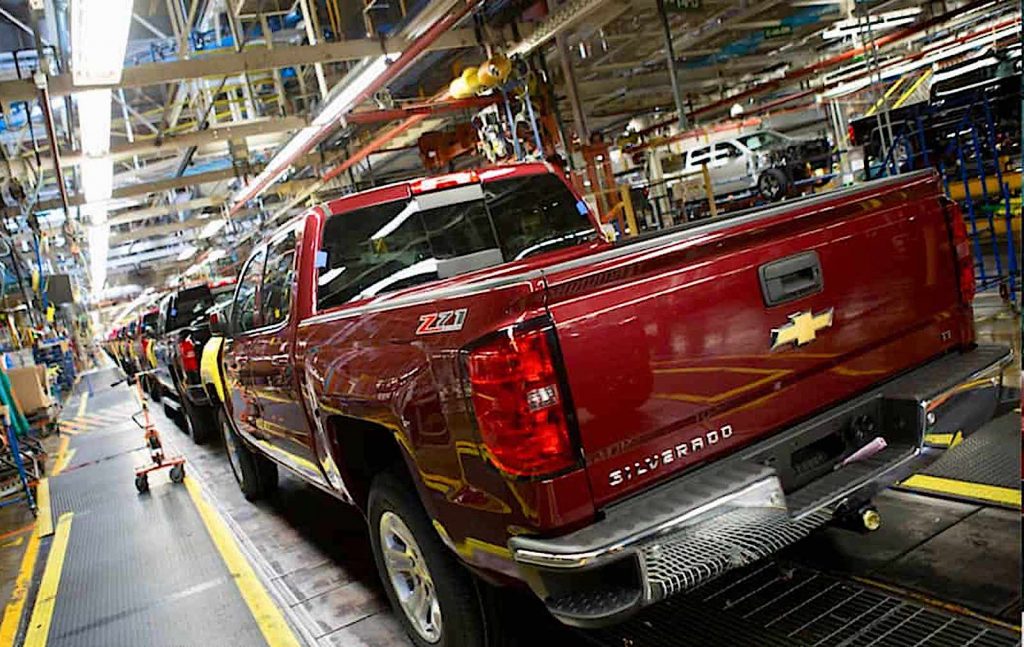Workers at General Motors’ truck assembly plant in Silao, Mexico voted in favor of a new independent union as their bargaining representative in contract negotiations with GM.

Workers in Silao voted more than 4 to 1 for representation by SINTTIA, a new union, which succeeded in defeating CTM, the union with deep connections to the political figures and the business establishment.
The victory a major accomplishment for SINTTIA and indicates workers in Silao were deeply dissatisfied with the relationship with GM and CTM, said Harley Shaiken, a labor expert from the University of California-Berkeley.
Wage disparity
The Silao plant employs more than 7,000 and builds some of the most expensive vehicles in the GM model line. But wages at the plant start at $9.20 per day under the current contract negotiated by CTM. The top wage in Silao for skilled trades under the contract is $33 per day or less than skilled worker at a GM plant in the U.S. would make in an hour at straight time, according to information from GM.
The current wage scale included in the old contract will remain in place pending negotiations with the new union, GM officials note.

According to the preliminary vote total released by the Mexican government, SINTTIA, received 4,192 votes, while CTM received 932 votes More than 87% of the Silao employees participated in the vote to select the union they wanted to represent them at the bargaining table in the future.
Until now workers at Silao had no chance to vote on or review CTM’s contracts with GM, which said it plans to open contract talks with the new union once the votes are certified.
Vote marks end of a difficult period
The vote capped off a contentious process offering workers in Mexico a larger voice in setting wages and working conditions. The process is backed up by provisions in the new U.S, Mexican and Canadian Trade Agreement, which are designed to break up the cozy relationship between American businesses and old-line Mexican labor unions that helped keep wages low.
Last summer, workers at Silao voted decisively for a change in union representation, which had been handled for years by a chapter of CTM, the century-old confederation of labor, which critics contend had a long history of signing sweetheart deals and intimidation. The deals benefited companies like GM and served to limit the influence of workers.

The goal of USMCA was to give independent unions more influence. Unions in the U.S, including the United Auto Workers, and their Democratic allies in Congress threatened to block the trade agreement if they did not include the provisions demanded by organized labor. Needing Democratic votes for passage of the proposed trade pact, the Trump administration agreed to the language demanded by American trade unions.
Unions, Biden administration hail outcome
Allies of organized labor in the U.S., such as Rep. Dan Kildee (D-Michigan), were instrumental in pressuring GM and the Mexican government in organizing the vote in Silao last year.
“The UAW congratulates the workers of GM Silao on forming a free, fair and independent SINTTIA union. We commend the Biden Administration and USTR for ensuring a fair election process and we look forward to a new era of free, fair, independent unions in Mexico,” said United Auto Workers President Ray Curry in a statement after the votes were counted.
Experts from Mexico’s National Electoral Institute and Human Rights Commission observed the vote, as did several external observers from academic and labor rights organizations.
“As workers, we are stronger when we can speak with one voice — and we are stronger when our fellow workers around the world can do the same,” said U.S. Secretary of Labor Marty Walsh. “The work of defending freedom of association never stops, but this historic election shows us that we can make progress toward the right of all workers to associate freely when we work together.”
The election is seen as a positive step forward after a worker rights’ action was first brought under the United States-Mexico-Canada Agreement, he added.







